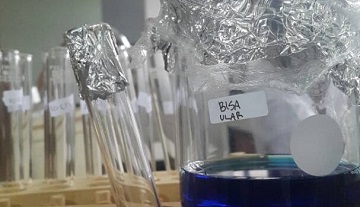Wohh …… Snake Venom Can Heal Cancer

Cancer is one of the most feared degenerative diseases today. It is a leading cause of death worldwide as the number of sufferers continues to increase. World Health Organization (WHO) states that every year there are ten million new cancer patients with an estimated increase of 20 percent per year. Breast cancer is one of the most dangerous cancers and has resulted in more than 400 thousand deaths per year in America. Innovation to detect and develop treatment continues. However, the mortality rate from the disease remains high. This is because the various therapies that exist at this time still can not handle the emergence of resistant cancer cells, especially in breast cancer that has spread. Therefore, innovative and effective, and affordable alternative cancer treatments are urgently needed for cancer patients with late-stage and refractory disease.
Breast cancer is now also the leading cause of cancer death among females in economically developing countries, a shift from the previous decade during which the most common cause of cancer death was cervical cancer. This breast cancer can be treated by surgery, chemotherapy, radiation therapy, hormonal therapy, targeted therapy (including immunotherapy such as monoclonal antibody therapy) and synthetic lethality. When dealing with breast cancer, obstacles may arise. Systematic use of chemotherapy does not show satisfactory results and often shows negative effects. Chemotherapy can have unintended side effects, including being toxic to organs. The side effects of chemotherapy vary greatly among individuals and among drug combinations. Side effects arise because many chemotherapeutic agents kill healthy cells as well as cancer cells, rebound effect of cancer therapy. Therefore, innovative and effective cancer treatments are urgently needed for cancer.
Who would have thought that alternative cancer treatment can be obtained from one of the dangerous and deadly animal venom Javanese cobra (Naja sputatrix). Can a deadly snake venom heal cancer. Some studies claimed that cobras can cure cancer. In fact, overseas cobras can be used as a cure for various diseases. The distinguished innovation in the systems of traditional medicine is the use of Javanese cobras. In fact, that is only half the story, for many materials which are toxic at high doses, when used sparingly and directed at specific targets, are not merely harmless, but actually beneficial.
This is the reason for a group of students of the Department of Biochemistry, Faculty of Mathematics and Natural Sciences of Bogor Agricultural University (FMIPA IPB) to examine the content in Java cobras venom to heal cancer. The group consisted of Yogia Ikhsas, Fitriana Rahma Puspita, Imanniar Yuta Ellana, and Bayu Kurniawan Aji who are members of Student Creativity Week.
Ironically, the properties that make venom deadly are also what make it so valuable for medicine. The L-amino acid oxidases (LAAOs) constitute a major component of snake venoms and have been widely studied due to their widespread presence and various effects, including cancer treatment. This enzyme content is very much and serves to strengthen the immune system and can accelerate the death of cancer cells. Cancer treatment method used in this study was the apoptosis induction principle. Apoptosis is a programmed cell death mechanism that can be triggered by modification of proteins, internal genes of apoptotic regulatory cells and induction of xenobiotic substances. Venom of Javanese cobra will be used as mediven or medical venom, the liquid product the venom have been undergone of the photooxidation process. The process has been intended to eliminate the toxic content of the snake’ venom.
This innovation is effective and efficient, because of two drops of venom of Javanese cobra can be dissolved for anti-cancer use many times. "Hopefully, mediven of Javanes cobra’ venom can substitute the chemotherapeutic medications of cancer which is relatively expensive and is not 100 percent safe. As chemotherapy can have unintended side effects, including being toxic to organs," said Yogia. (Wied)



